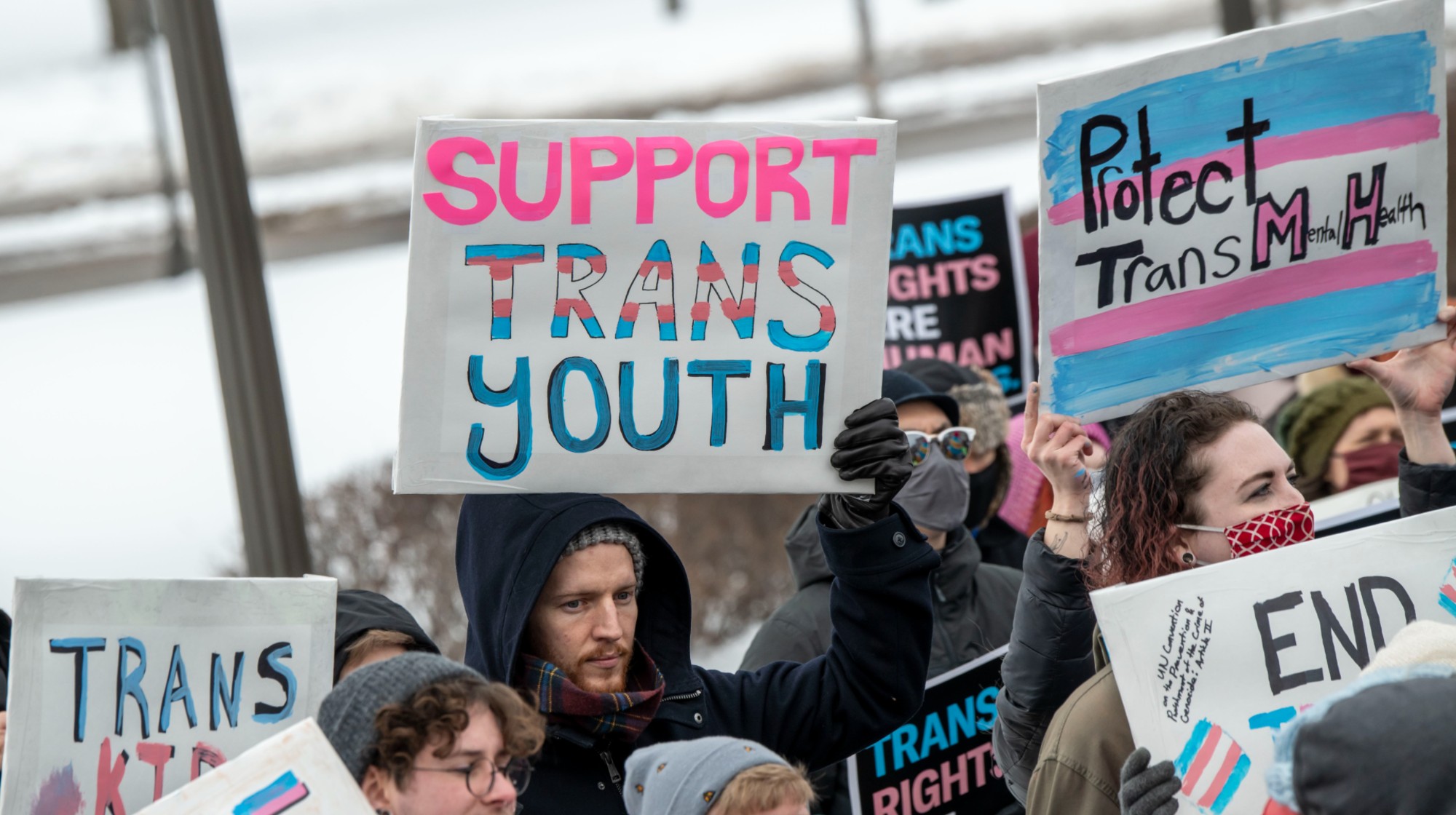Where the UK’s political parties stand on trans rights
Keir Starmer has called for a more ‘respectful’ debate on transgender issues – but Labour’s stance is unclear

A free daily email with the biggest news stories of the day – and the best features from TheWeek.com
You are now subscribed
Your newsletter sign-up was successful
The leader of the Labour Party is urging ministers to overhaul gender recognition laws to introduce greater “respect and dignity” for transgender people.
But while Keir Starmer told The Times that “trans women are women” and that a more “respectful” debate on transgender issues was needed, members of his own shadow cabinet have taken a more ambivalent stance.
Starmer spoke out after shadow home secretary Yvette Cooper told Times Radio that she did not “want to go down the rabbit hole of defining what a woman is”. And Anneliese Dodds, Labour’s minister for women and equalities, told BBC Radio 4’s Women’s Hour that the definition depended on the “context”.
The Week
Escape your echo chamber. Get the facts behind the news, plus analysis from multiple perspectives.

Sign up for The Week's Free Newsletters
From our morning news briefing to a weekly Good News Newsletter, get the best of The Week delivered directly to your inbox.
From our morning news briefing to a weekly Good News Newsletter, get the best of The Week delivered directly to your inbox.
This apparent lack of unity on trans issues is not confined to Labour. So just where does each of the UK’s main parties stand on trans rights?
Labour
Labour’s 2019 manifesto pledged to uphold transgender rights and to push for reforms to the Gender Recognition Act “to introduce self-declaration for transgender people”.
But critics claimed “the manifesto appeared to send two contradictory messages on trans issues”, by also pledging to protect “single-sex spaces” in accord with the Equality Act 2010, the i news site reported. Anti-trans pressure groups suggested that the party was “giving tacit support to those who wish to deny transgender women access to women’s spaces”, the site said.
However, Starmer’s spokesperson insisted during last autumn’s Labour conference that the women-only spaces law “rightly assumes the inclusion of trans women, except in specific circumstances”, The Independent reported. The Labour leader was said to remain wedded to the policy, and there was “no reason to expect” that his stance was “going to change”.
A free daily email with the biggest news stories of the day – and the best features from TheWeek.com
Deputy leader Angela Rayner also reaffirmed Labour’s support for gender recognition law reforms during the conference, in Brighton in September. “Women’s rights are not in conflict with trans rights,” Raynor told an LGBTQ+ panel event.
Conservatives
Theresa May pledged during her reign as prime minister to introduce reforms to the Gender Recognition Act that would have enabled people to officially change gender without medical checks. But the party’s 2017 manifesto made no mention of the issue, and Boris Johnson ditched May’s pledge after taking over at No. 10.
Pink News reported last year that Johnson and then equalities minister Liz Truss did consider reforming the act. But Truss “changed her mind” following “input” from NHS England’s national advisor for LGBTQ+ health, the news site said. Instead, Truss cut the cost of legally changing gender from £140 to £5 and moved the application process online in a bid to streamline the system.
Mixed messaging has emerged from within Tory ranks, however. At the Conservative conference in Manchester last October, Carrie Johnson urged party members to fight for the rights of transgender people. “Whether you are LGBT+ or an ally like me, we are all committed to equality and acceptance for everyone, whoever you are and whomever you love,” she told a fringe event.
But just weeks later, her husband praised the work of the LGB Alliance, which has been accused of transphobia. The PM’s championing of a conference organised by the charity marked a “significant intervention in the debate over trans rights”, said The Times.
Liberal Democrats
The Lib Dems formally passed a motion at the party’s autumn 2020 conference acknowledging members’ belief that “trans women are women, trans men are men and non-binary identities are non-binary”. A statement subsequently published on the party’s website during Trans Visibility Week affirmed that “these sentences are not contentious in our party”.
The commitment came after a Lib Dem activist was banned from holding party office for ten years following complaints about a T-shirt reading “Woman: Adult, Human, Female” that she wore to a meeting in 2018. Natalie Bird has since launched legal action against the Lib Dems for discrimination under the Equality Act.
Asked whether Bird’s case represented a retreat from liberalism, Lib Dem leader Ed Davey told the BBC’s The Andrew Marr Show last year that “we absolutely believe in free speech, but we also believe that we need to protect human rights and we need to believe in equality”.
Reiterating the party’s official stance, Davey said that “a trans woman is a woman and a trans man is a man – and that is the issue that we’re fighting on. We believe trans rights are human rights.”
SNP
Trans rights has been a subject of fierce debate within the SNP since leader Nicola Sturgeon first outlined plans to reform gender recognition back in 2016. The party website states that “we remain firmly committed to improving the lives of trans and non-binary people”.
On 3 March this year, the party unveiled the Gender Recognition Reform Bill – a set of proposals intended to speed up the process for getting a gender recognition certificate (GRC). Outlining the bill, Shona Robison, the devolved Scottish government’s social justice secretary, said trans people were “among the most stigmatised in our society”.
Critics have suggested that the reforms are incompatible with equalities law. On the SNP website, the party insisted that “we will ensure that these changes do not affect the rights or protections that women currently have under the Equality Act”.
Greens
The Green Party’s 2019 manifesto made commitments to increase NHS funding for “trans healthcare” and “gender identity clinics”, and to remove the “spousal veto” so that married trans people can acquire a gender recognition certificate without permission from their partner.
The Greens also promised to update the Gender Recognition Act “to allow trans youth and non-binary people to get legal recognition through self-declaration”.
The party website states that “the Green Party recognises that trans men are men, trans women are women, and that non-binary identities exist and are valid”. Under the party’s plans, the only requirement for individuals to change their legally recognised gender would be “a statutory declaration”.
Yet while the Greens’ official policy is clear, the issue has caused internal divisions.
Siân Berry resigned as Green leader in England and Wales last July, citing conflict between party members over trans rights. A vocal supporter of trans equality, Berry said that a “failure of leadership” on her part had resulted in “mixed messages” being sent.
““There is now an inconsistency between the sincere promise to fight for trans rights and inclusion in my work and the message sent by the party’s choice of frontbench representatives,” she said in her resignation letter, after reportedly clashing with colleagues.
“This inconsistency has left me in a very difficult position. I can no longer make the claim that the party speaks unequivocally, with one voice, on this issue.”
-
 6 exquisite homes with vast acreage
6 exquisite homes with vast acreageFeature Featuring an off-the-grid contemporary home in New Mexico and lakefront farmhouse in Massachusetts
-
 Film reviews: ‘Wuthering Heights,’ ‘Good Luck, Have Fun, Don’t Die,’ and ‘Sirat’
Film reviews: ‘Wuthering Heights,’ ‘Good Luck, Have Fun, Don’t Die,’ and ‘Sirat’Feature An inconvenient love torments a would-be couple, a gonzo time traveler seeks to save humanity from AI, and a father’s desperate search goes deeply sideways
-
 Political cartoons for February 16
Political cartoons for February 16Cartoons Monday’s political cartoons include President's Day, a valentine from the Epstein files, and more
-
 How corrupt is the UK?
How corrupt is the UK?The Explainer Decline in standards ‘risks becoming a defining feature of our political culture’ as Britain falls to lowest ever score on global index
-
 The high street: Britain’s next political battleground?
The high street: Britain’s next political battleground?In the Spotlight Mass closure of shops and influx of organised crime are fuelling voter anger, and offer an opening for Reform UK
-
 ‘Space is one of the few areas of bipartisan agreement in Washington’
‘Space is one of the few areas of bipartisan agreement in Washington’Instant Opinion Opinion, comment and editorials of the day
-
 Trump HHS moves to end care for trans youth
Trump HHS moves to end care for trans youthSpeed Read The administration is making sweeping proposals that would eliminate gender-affirming care for Americans under age 18
-
 Is a Reform-Tory pact becoming more likely?
Is a Reform-Tory pact becoming more likely?Today’s Big Question Nigel Farage’s party is ahead in the polls but still falls well short of a Commons majority, while Conservatives are still losing MPs to Reform
-
 Taking the low road: why the SNP is still standing strong
Taking the low road: why the SNP is still standing strongTalking Point Party is on track for a fifth consecutive victory in May’s Holyrood election, despite controversies and plummeting support
-
 Anti-trans scandal roils major LGBTQ+ literary prize as authors withdraw en masse
Anti-trans scandal roils major LGBTQ+ literary prize as authors withdraw en massein the spotlight Multiple nominees for the UK's premier queer writing award have removed themselves from contention to protest the inclusion of a self-proclaimed 'trans-exclusionary radical feminist' in their ranks
-
 What difference will the 'historic' UK-Germany treaty make?
What difference will the 'historic' UK-Germany treaty make?Today's Big Question Europe's two biggest economies sign first treaty since WWII, underscoring 'triangle alliance' with France amid growing Russian threat and US distance